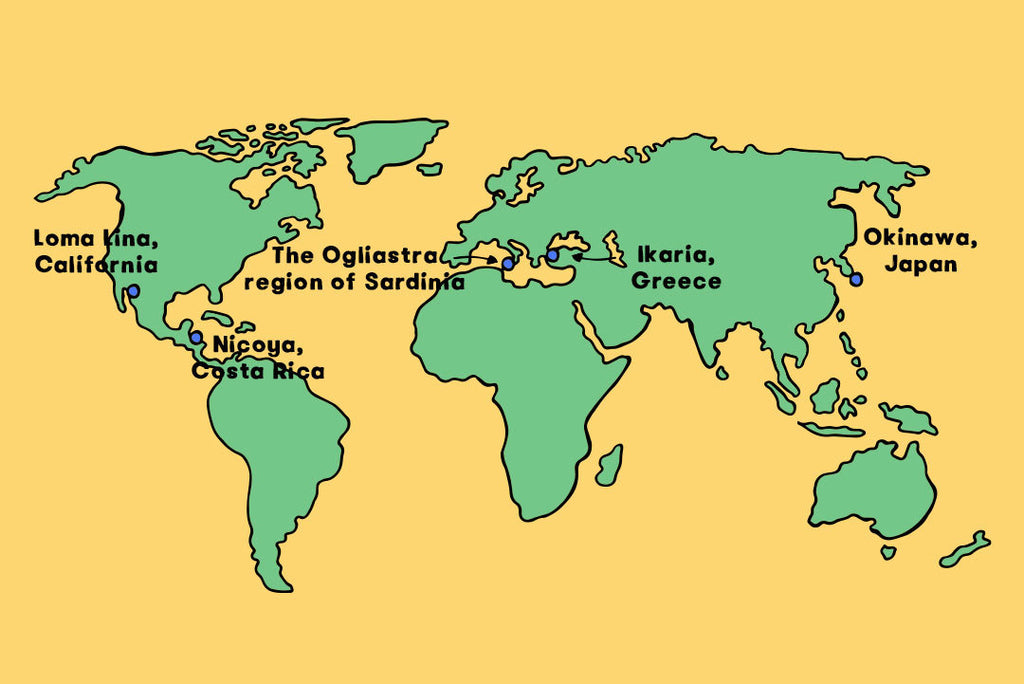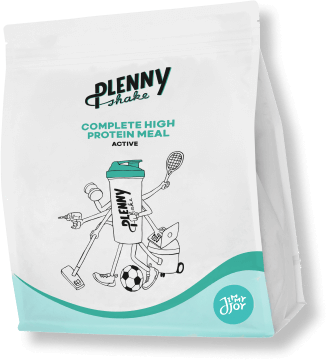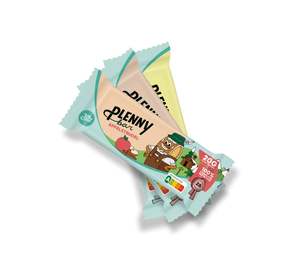
Only about 10 percent of how long the average person lives is established by our genes. The other 90 percent is dictated by our lifestyle (1). Okay, let’s all start by taking a deep breath – we get it – it’s somewhat overwhelming to know that the choices you make in your everyday life pretty much determine how long you’ll live.
In a perfect world, we would know the answer to “what do I need to do to live longer than 100 years?” Yet, we don’t live in a perfect world, and no one has the answer to that. That is because us humans use cognitive biases when making decisions. We systematically make irrational choices, because we are not rational beings. That would actually be humanly impossible, because we make more than 35.000 decisions in one day (3). But, all of these small decisions we make, piling up together, can potentially influence our life longevity.
The dilemma is, who should you listen to and what is the right decision? Should you listen to your mom who says that if you don’t eat enough meat you’ll lack vitamin B12? Or should you listen to that Jimmy Joy nutritionist who says Jimmy Joy meals are vegan and still contain the optimal amount of B12? Well, we don’t want to be biased, so we’ll just go ahead and introduce you to Dan Buettner, the best-selling National Geographic author, who spent his entire life studying the populations with the longest lifespan, also known as The Blue Zones.
The fact is that humans are not created to live to an extremely old age. Blame it on evolution. We are created to procreate, and expected to live to see our second generation of descendants, and that’s it. We’re not made to reach 130 years. That is why a 65 year old person ages at a rate of about 125 times faster than a 12 year old (1). Science tells us that the capacity of a male body is to live to being about 90 years old (for women you can add a couple of years more) (1). Yet, if we look at the Netherlands, for example, the average life expectancy is 81 (4). In other words, you could potentially live 9 years longer. Yes, 9 years! So, what we prepared for you in this article is a summary of things you can do to increase your lifespan.
What are The Blue Zones?
Blue Zones are communities whose elders live with vim and vigor to record-setting age. They live to 100 years of age. And the life expectancy is 110 years, or even greater in some cases. They have been studied in detail by medical researchers, anthropologists, epidemiologists and demographers and show the greatest longevity across all human populations on Planet Earth. In those populations, disease and mortality are highly unusual to be the cause of death. The Blue Zones see the main cause of death simply as “old age” (2). They aren’t “trying” to live to an old age, it’s just the standard way of life for them. They also experience extremely low rates of cancer, diabetes, obesity, heart disease, and other preventable diseases (5).
Let’s cut to the chase. These are the Blue Zone places, where the sweet long life happens (6,7,8):
- Okinawa, Japan –home to the world’s oldest women. They primarily eat soy-based food and practice a meditative form of exercise, known as tai chi.
- The Ogliastra region of Sardinia – a region high in the mountains, where the world’s oldest men live. They work as farmers and drink a lot of red wine.
- Ikaria, Greece –an island, where people enjoy the Mediterranean diet full of olive oil, wine, and home-grown vegetables.
- Nicoya, Costa Rica – it is a region where people do a lot of physical work, eat a diet based on beans, rice, and corn tortillas. They have a sense of life purpose known as “plan de vida.”
- Loma Linda, California – a very religious community of people, eating only plant-based foods.

If you are about to type “non-return flight to Costa Rica” into your browser, we’ll have to stop you right there. You won’t need to move there to extend your life longevity (but you can if you want to – eating tortilla chips on the beach of Costa Rica doesn’t sound that bad to us either).
We summed up a list of 10 things the Blue Zone populations have in common based on the research of Dan Buettner and other National Geographic scientists. We can all learn from it and look at it as a compass guiding us through the steps we can take in the future to pursue a more proactive and healthy lifestyle. And to, essentially, add a few years to our lives.
What do Blue Zone populations have in common?
1. Have a strong life purpose
They follow a life purpose they strongly believe in, known as “ikigai” in Okinawa or “plan de vida” in Nicoya. This “reason to live”, helps them keep a positive outlook on life and provides them with something to look forward to in each day. This is a very powerful factors, because research shows that having a strong life propose can extend your life expectancy by seven extra years (9).
2. Eat 95% plant-based food
They don’t count calories, or do diets, nor do they read the labels, or take supplements. They hand pick and self-grow their food. It mostly comes from the gardens and it’s all seasonal. They eat grains, nuts, legumes, fruits, and vegetables. And most importantly – they eat 95% vegan. This means only 1 in 20 meals consumed includes meat based products.
You may be wondering: why not 100% vegan? Well, some are 100% vegan. But most consume small amounts of free-range meat. It’s important to remember that while a vegan diet is great, unless you pair it with sufficient levels of supplements (i.e. what you can’t get from plants only) then you might lack some important nutrients. It’s still foolish to believe that supermarket packaged meat contains all those nutrients. There is a high chance that to some level animal products artificially contain these supplements via fortified cattle feed or injections, that we then secondarily bring into our bodies.
Blue zone populations do not take any supplements or medication. All their nutrients are consumed from what they eat. So, the 5% of meat might just be to get that B12 vitamin and enough omega from fish. Luckily, we have a solution for you. Jimmy Joy products are not only 100% vegan, but also enriched with B12 vitamin (here you can read why B12 is so important); they contain a mix 27 most essential vitamins and minerals.
3. Consume alcohol, but in moderation
Blue Zone populations drink 1-2 glasses of alcohol a day, mainly red wine. Well, the research findings on this topic are rather contradicting. One stream of research says that drinking frequently but in small doses is shown to significantly reduce mortality, particularly from heart disease (10, 11). Natural red wine contains antioxidants from grapes, which help prevent damage to the DNA that contribute to aging (12).
Yet, another stream of studies has found inconclusive results in the relationship between life longevity and alcohol consumption. It could be believed that there are other factors (e.g. moderate wine drinkers live a healthier lifestyle) that contributed to such results (13, 14). It is also important to remember that only moderate alcohol consumption could (if even) promote lower mortality. Higher levels of alcohol consumption are, as a matter of fact, associated with increased mortality (15).
4. Fast and follow the 80% rule
Next to fasting, the long-term calorie restriction, they follow the 80% rule. That means they finish eating when they feel 80% full, rather than 100% full (or in some cases 110% aka food coma full). They eat their largest meal at the beginning of the day, and only eat something very small in the evening, and never right before going to bed. They also eat very slowly, which eats to better digestion and leaves you feeling satisfied for longer. We also wrote an article on mindful eating as well as on intermittent fasting - you should check them out.
5. Exercise
By exercise we don’t mean going to the gym, running marathons, or lifting weights. The exercise is built into their daily routine, for example, through gardening, walking, cooking and other daily chores. Because they are very intertwined with nature, they work outside, raise animals in the fields, harvest crops, and do chores that require movement and physical activity.
They perform low intensity physical activities, over longer periods of time. What most of us probably do is sit behind the computer the entire day, and then in the evening sweat like crazy doing a high intensity workout for 45 minutes and then go back to looking at the screen. The low intensity movement throughout the day as opposed to intense short-periods can help slow down cellular ageing (16).
6. Get enough sleep
They don’t press “next episode” to binge watch that documentary series on Netflix at 1am, then wake up frantically by pressing “snooze” about 16 times, and drink 8 flat whites before its even noon. They go to sleep with the sun and wake up with the sun. Their sleeping time is built into their natural body clock. The optimum amount of sleep is shown to be between 7-8 hours. They also take daily naps, of 30 minutes or less.

7. Are spiritual
They are typically religious or faith-based communities, they promote positive thoughts and feelings. Having a strong belief into a higher power can lead to increased longevity.
8. Have a strong relationship with their family and friends
They take good care of their elders, and take pride in being a part of the family. The older people enjoy spending time with the grandchildren, because it keeps their mind young and sharp. Different generations often live in the same house and spend time together.

They also have strong bonds with their friends. They don’t necessarily have a big group of friends, but a few close ones. Having close friends can reduce a possibility of mental issues, prolong life expectancy, and decrease the risk of chronic conditions.
9. Have a healthy social network
Your social network can influence your health and well-being. If you surround yourself with positive people it is highly likely you will have a more positive outlook on life yourself. But it unfortunately works both ways. For example, if you surround yourself with a social circle who parties every night and pursues an unhealthy lifestyle – we all know how it goes. It might be more difficult to say no to happy hour on a Monday night.
Another important factor is that their relationships are nourished in person. They don’t rely on the technology. They are immune to social media, because they are not exposed to these externalities in their life. That is believed to be a very significant factor to their stress-free and happy life, as well as having more genuine and stronger relationships.
10. Naturally mitigate stress
Chronic stress leads to inflammation and inflammation is a contributing factor for the development of many chronic illnesses. Here is how the blue zones manage stress. In Ikaria they take a daily nap; Lomo Linda population prays daily; and in Japan they take the time to reminisce about their ancestors. They all also spend a lot of time outdoors. They are not exposed to technology or artificial light, or stay inside closed dark spaces for a long time. Sunlight can increase the brain’s release of hormone serotonin, which is associated with boosting your mood and helping you stay calm and focused. Of course, we mean sunlight exposure in moderation and by wearing sunscreen. Did you know regular use of sunscreen can prevent skin aging faster (17)?
Conclusion
It takes 21 days to adopt a new habit. We challenge you to choose one element from the ten listed above and try to make it your new favourite thing. We also challenge you to pick something other than number 3 😏. Let us know on our forum which habit you picked, we are very curious!
Sources
(1) Buettner, D. (2009). https://www.ted.com/talks/dan_buettner_how_to_live_to_be_100. Retrieved from Ted Talk: https://www.ted.com/talks/dan_buettner_how_to_live_to_be_100
(2) Buettner, D., & Skemp, S. (2016). Blue Zones - Lessons From the World’s Longest Lived. Am J Lifestyle Med., 318–321.
(3) Krockow, E. M. (2018, September 2018). How Many Decisions Do We Make Each Day? Retrieved from Psychology Today: https://www.psychologytoday.com/us/blog/stretching-theory/201809/how-many-decisions-do-we-make-each-day
(4) The World Bank. (2018). https://data.worldbank.org/indicator/SP.DYN.LE00.IN?locations=NL. Retrieved from The World Bank: https://data.worldbank.org/indicator/SP.DYN.LE00.IN?locations=NL
(5) Hill, S. J. (2020). BLUE ZONES: WHAT CAN WE LEARN FROM THE POPULATIONS WHO LIVE THE LONGEST? Retrieved from Plant Proof: https://plantproof.com/blue-zones-what-can-we-learn-from-these-populations/
(6) Blue Zones. (2020). https://www.bluezones.com/. Retrieved from Blue Zones: https://www.bluezones.com/
(7) Robertson, R. (2018). https://www.healthline.com/nutrition/blue-zones#TOC_TITLE_HDR_9. Retrieved from Healthline: https://www.healthline.com/nutrition/blue-zones
(8) National Geographic. (2017). 5 “Blue Zones” Where the World’s Healthiest People Live. Retrieved from National Geographic: https://www.nationalgeographic.com/books/features/5-blue-zones-where-the-worlds-healthiest-people-live/
(9) Hill, P. L., & Turiano, N. A. (2014). Purpose in life as a predictor of mortality across adulthood. Psychol Sci., 1482-1486.
(10) Klatsky, A. L. (1999). Moderate drinking and reduced risk of heart disease. Alcohol research & health, 23(1), 15.
(11) Thun MJ, Peto R, Lopez AD, Monaco JH, Henley SJ, Heath CW Jr, Doll R. Alcohol consumption and mortality among middle-aged and elderly U.S. adults. N Engl J Med. 1997 Dec 11;337(24):1705-14.
(12) Baxter, R. A. (2008). Anti‐aging properties of resveratrol: review and report of a potent new antioxidant skin care formulation. Journal of cosmetic dermatology, 7(1), 2-7.
(13) Holahan CJ, Schutte KK, Brennan PL, North RJ, Holahan CK, Moos BS, Moos RH. Wine consumption and 20-year mortality among late-life moderate drinkers. J Stud Alcohol Drugs. 2012 Jan;73(1):80-8.
(14) Simona Costanzo, Giovanni de Gaetano, Augusto Di Castelnuovo, Luc Djoussé, Andrea Poli, David P. van Velden, Moderate alcohol consumption and lower total mortality risk: Justified doubts or established facts?, Nutrition, Metabolism and Cardiovascular Diseases, Volume 29, Issue 10, 2019, 1003-1008.
(15) Di Castelnuovo A, Costanzo S, Bagnardi V, Donati MB, Iacoviello L, de Gaetano G. Alcohol dosing and total mortality in men and women: an updated meta-analysis of 34 prospective studies. Arch Intern Med. 2006 Dec 11-25;166(22):2437-45.
(16) Bas, G., Loisate, S., Hudon, S. F., Woods, K., Hayden, E. J., Pu, X., . . . Uzer, G. (2020). Low Intensity Vibrations Augment Mesenchymal Stem Cell Proliferation and Differentiation Capacity during in vitro Expansion. Scientific Reports, 9369.
(17) Hughes, M. C., Williams, G. M., Baker, P., & Green, A. C. (2013). Sunscreen and Prevention of Skin Aging. Annals of Internal Medicine, 781-790.


















